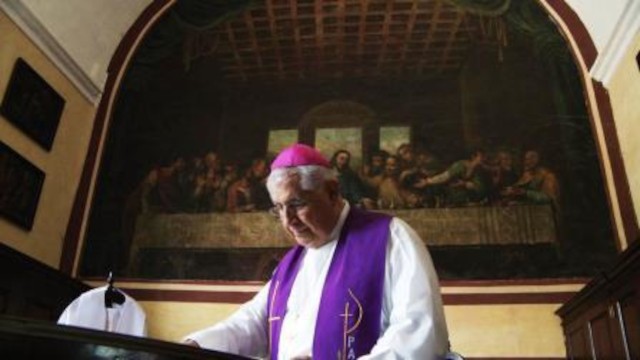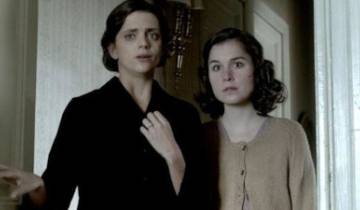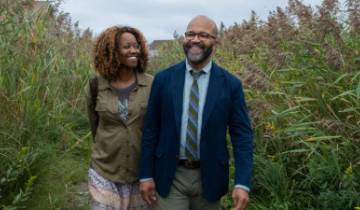
"Agnus Dei: Lamb of God" and the confrontation with the unrepresentable
Dir. Alejandra Sánchez / Mexico / 2010 / 84 min
By Alejandro Varderi
The authorities are increasingly interested in shedding light on the abuses against young people by some priests because, as Pope Francis recently declared, "the direction that the Church has taken is irreversible." Something that is extremely necessary to protect the victims and judge the perpetrators, despite the fact that many times those who have suffered abuse are afraid to report it for fear of being stigmatized by the society in which they live; this without also counting on the power that religious iconography has over the psyche of the parishioners.
"For me God our Lord is everything, I even tell Him to take out my heart and clean it." This quote, taken from the documentary "Agnus Dei: Lamb of God" (2010), by the Mexican filmmaker Alejandra Sánchez, condenses the perception that a large part of believers have about religion as the owner of their bodies and where the priest who appears Iconic, being the representation of the Son on earth, it is untouchable and sanctified, possessing the same rights as the latter over the flesh and the spirit. That is why, when a nun learns that a certain priest imprisoned for child abuse was abused by other prisoners, she cries to the cry of "the body of Christ outraged!"
“You are the chosen race”, the priest in charge of guiding them in their vocation also reminds the seminarians, quoting the words of the “first letter of the Apostle Saint Paul to the Corinthians”, and consequently exhorting them to exercise that power over the congregation. , whose deviations are exposed in Sánchez's documentary. In this sense, the confidence that the chosen one generates in the congregation becomes blind and without suspicion, leaving the perception of abuse overshadowed by faith in the acts performed by the representative of Christ. She is not surprised then that the mother of the minor, seeing a photo of this nude in the priest's house, perceives it as something normal, because she "surely would have been swimming in the pool."
This relationship of power and intrinsic subjection in relationships of trust between protagonists belonging to different social, cultural and economic strata, is magnified within the religious establishment, as one of the participants is spiritually above the other; something crucial to guarantee the absolute and irrefutable confidentiality of the victim in the actions of the perpetrator. If that trust is broken, as happened to the abused when, as an adult, he understood the ramifications of the damage suffered due to the actions of the priest in whom he had given himself completely, then the relationship is corrupt because those who trust others see who are being exploited for their perfidy and realize that the established dynamic was sustained only by fear. A fear that paralyzed the young man for years, making him feel guilty, ashamed and incapable of articulating for himself, his parents, relatives and friends the horror of the acts; a fear, also colored by the fear of rejection by the community, if it were to find out what had happened to him.
The coercion that the intolerance of others exerts on the victim fosters the impunity of the perpetrator, who will continue to subject new prospects to his perverse behavior. But if the evil of the victimizer is promoted by the indifference of the group, it is no less true that the moral and spiritual victory of the victim transcends the evil, raising it above the horror to show it in all its misery. This was represented in the documentary in the scene of the confrontation, where the priest in fixed shot is questioned by the voiceover of the boy who, by crossing the personal space of the criminal, violates his status as untouchable and places him on the same level as him, giving him back some of the dread experienced in a stolen childhood, just as he states during the exchange.
This film resource also allows the director to expose the criminal to the viewer's gaze and protect the tormented, generating a double discourse with the missing part of each one: the voice of the priest and the face of the young man. In fact, even when his voice is heard on camera, it gradually becomes unintelligible, not only because it reaches us haltingly, but because he denies the accusations between stammers and innocuous arguments seeking to evade his responsibility in the drama. Only the hand moving nervously on the sofa betrays the state of mind of the accused, who will keep his face inscrutable, mirroring the pictorial representations of divinities, canons and saints who, mentally abstracting from the environment, seem to be physically elsewhere
.
Such behavior reflects the ancient attitude of the Catholic Church, the majority in Latin America, accustomed to drawing a hermetic veil over its actions in order to protect the privacy of the Curia. From previous Popes to seminarians, impunity has been key to the survival of the institution throughout the centuries. “Wise as serpents and simple as doves”, as Monsignor Elortondo reads from the “Gospel” to Father Ladislao in the historical film “Camila” (1985). A procedure that in general terms has not changed even today, despite having come to light part of the abuses against minors in countries such as Chile and Spain, where the cover-up and protection of the clergy seemed to be beyond earthly justice until recently. , under the premise that divine justice will act in his place.
Although when Alejandra Sánchez shot her documentary the perpetrator continued to officiate and victimize, after ten years of litigation he was imprisoned for life; a victory for the abused young man and his family, and a milestone within the Mexican Church, always reluctant to deal with thorny issues such as pederasty and abortion. In this sense, even though since 2007 Mexico City has legalized the latter during the first trimester of pregnancy, the Penal Code only considers it legal in the case of rape and in Guanajuato, for example, it is punishable by up to 30 years in prison. .
As is constant in Latin America, the legislation favors the most intolerant groups in society, who are precisely the ones in charge of dictating it and perpetuate dogmatic narratives, favoring totalitarianism from both the right and left, set to subjugate society under the sign of a “single truth”. This enhances the power of the Church, since dogmas constitute the founding principle of Catholic doctrine, in addition to justifying dictates with which to manipulate the most vulnerable sectors. That is why adolescents, women and the elderly tend to be the best fertilizer in the Garden of God, recurrent as a metaphor from "Genesis" to "Apocalypse", and carefully fertilized by their representatives on earth with the substrate of naivety. , the weakness and fanaticism of our peoples; especially as regards rituals, emblems and ecclesiastical sumptuousness.
In the eyes of the parishioner, such iconography reinforces the incontestable dogmas and the superiority of the clergy, and for future priests it constitutes an added attraction to the vocation. In fact, the interviews conducted by the director with the young applicants have as a common denominator her fascination with the Catholic imaginary. "Since I was little I was an acolyte, and since then I was attracted, I was attracted by things from the church, the priests and all that", expresses the voiceover of a seminarian while he puts on his cassock and combs his hair with hairspray in front of the mirror. “I have dreamed that I am a priest, that a bishop is at the ordination mass and he is laying his hands on me and that I am going to be a priest,” says another, dressed in a T-shirt that reads “Property of Jesus Christ”, in a game shot-reverse shot of an altar with Christ on the cross and the middle shot of a richly dressed virgin.
The fetishization of the symbols and instruments of the cult adds the seditious ingredient that makes religion subversive, promoting self-sacrifice and denial of instincts. “I have always seen that my classmates get along with their friends, and they appear in the photos hugging and like that; and… I would also like to make a life, but that is part of my sacrifice”, reveals a third party, still torn between mystical and corporeal exaltation, at this stage of the discovery of one's own sexuality where these instincts emerge on fire.
The marked eroticism of the artistic representations, the ornamental and chromatic richness of the garments and accessories, the profusion of noble metals and precious woods, the stylistic range of the temples between frugality and excess, provide the carnivalesque ingredient, becoming important influences within of the closed space of schools and seminaries where students and teachers coexist. This has repercussions on the psyche of young people, disorienting them and forcing them to adopt a repressive attitude, easily manipulated by those who are ready to guide them with a wise hand along the path of (im)perfection, where "excess affection", as a grotesque allegory , blurs the borders between what is permitted and what is prohibited.
The sequence of the confrontation in the film synthesizes these perceptions as it opens with a medium shot of the priest officiating mass, and intersperses photographs of the sexual act with a long shot of the young man watching him officiate. This, followed by the scene where the dialogue between the two is included. “I want you to explain to me what happened... When I met him, everything was wonderful for me and I began to love him very much, like a father figure, but when he abused me, confusion came... All I did was love him madly”, confesses the voice in off of the abused. "If you want, it was an excess of affection," the abuser responds to the camera.
The way in which the filmmaker incorporates into the diegesis the symbols of the Catholic ritual, the graphic testimonies and the guidelines of the conversation expose the emotional ambiguity of the accuser and the attitude of superiority of the accused —who still feels protected by these symbols and therefore exempt to account for his actions to a former altar boy, on whom he turned that "excess" as a mark of distinction for being the chosen one.
"He stole my childhood, father, he pushed me to live something that I didn't have to live at that time," continues the accuser, leaving the defendant unable to argue reasons or apologize. That silence, however, turns out to be very eloquent as it reveals the magnitude of a damage for which there is no healing or forgetting. Here the psychological trauma drives the young man's desire for justice, who has managed to rebuild his emotional life with a woman and have a child, but continues to be plagued by memories of the abuse.
The perpetrator, for his part, seeks to hide behind religious discourse in order to downplay the victim's suffering and distance himself from the material and legal implications of the acts committed. Something difficult to achieve in this contemporaneity, however, when the victims are being heard, and in a growing number of cases the guilty have been punished and sentenced, as evidenced by the conviction of the priest involved in 2018.
In fact, the years that have elapsed between the making of the documentary and the success of its purpose are witness to the growing activism of many associations founded to expose the exploiters and vindicate the exploited, who, thanks to new technologies, receive solidary support and media coverage impossible to achieve before the digital age. This has been fundamental so that more victims have managed to overcome the fear on which the silence was based, and have begun to openly tell their experiences.
However, the reactions of the ecclesiastical authorities to such complaints have often sought to cover up the guilty or transfer them to another diocese and recommend penance to purge their sin. “The problem of the Catholic Church is not that there are priests who abuse; that is a human problem… What is specific to the Church is the systematic way of protecting abusers”, points out a former priest, emphasizing the sectarianism of an institution prone to turning in on itself, because he knows that in this secrecy lies the key to his survival throughout history.
The way in which the archives with the evidence of the abuses are silenced from within, with the support of political and economic groups, evidences the mechanisms of repression that the most intolerant sectors of society use to maintain their power and exercise it over those who dissent. The Church affirms itself in them, and in this way it can brand the dissidents of plotting against her, alleging an alleged harassment of her priests in order to discredit her.
.
E
he growing number of complaints is certainly the best barometer when it comes to taking stock, and in this sense the media are playing a fundamental role in raising awareness, erasing the stigma of abuse and encouraging victims to abandon their silence. This, however, does not guarantee that the Catholic Church in Latin America will voluntarily collaborate with the investigation, as the North American, German, French or Irish have done; Probably because its millenary influence on the lives and consciences of the people, in addition to its ascendancy on matters of state and its enormous patrimony, make it difficult to make decisions where its wealth, prestige and ascendancy over key figures of society are at stake. national life.
The success obtained so far in persecuting and imprisoning the guilty must be recognized, it is very relative since the legal obstacles put in place by the Church and the fear of airing the horror on the part of the vast majority of abused persons make the work difficult. "It is reasonable to think that there are hundreds of thousands of victims around the world," emphasizes one of those tortured affiliated with ECA Global, an "organization of human rights activists and survivors from 17 countries on five continents, focused on children and victims' rights to force the Church to end clerical abuse." Something that shows how necessary activism and social networks are to disseminate information, and reach men and women who were victimized five or six decades ago, but never found an interlocutor with whom to voice the torture to which they were subjected and with the who have lived in silence throughout their existence.
"Agnus Dei: Lamb of God" is irrefutable proof of the importance of the documentary genre to raise awareness, around such urgent issues as pederasty within the Catholic Church, despite the obstacles that institutional and social intolerance exerts on whistleblowers , in a context that is vulnerable to abuse given the precarious cultural and economic situation of many of the victims, together with their unquestionable faith in Christ's representatives on earth. The fact that, for the first time in Mexico City, one of these representatives has been sentenced to 63 years in prison, sheds a light of hope on the hundreds of victims still hidden in the shadows of fear and shame; two variables on which the abusers and the Church itself count to minimize the damage to them and to the institution.
Fear and shame then, that the machinery of power fosters through mechanisms of repression, not only on the victims but also on their families, often finding themselves forced to change their neighborhood, city, state or country in order to escape the gossip already the mark of prejudice; although the clinical picture of depression can lead the abused to drink, as was the case of the protagonist of the documentary, or even to suicide.
Revealing such abuses is essential to make amends to the victims and punish the guilty who, unfortunately, continue to hold positions of power in Latin America, despite the denunciations. Something that this documentary has finally achieved by bringing more hope to those who suffered with and because of her, but managed to overcome their fears and speak out.


